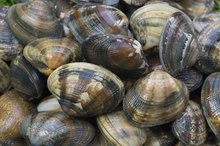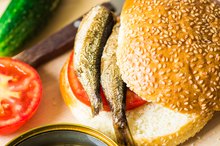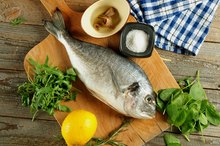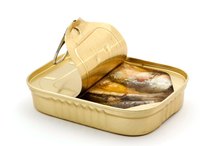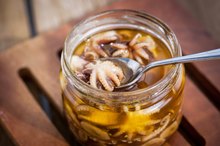What does fact checked mean?
At Healthfully, we strive to deliver objective content that is accurate and up-to-date. Our team periodically reviews articles in order to ensure content quality. The sources cited below consist of evidence from peer-reviewed journals, prominent medical organizations, academic associations, and government data.
- Harvard School of Public Health: The Nutrition Source: Fats and Cholesterol: Out With the Bad, In With the Good
- Linus Pauling Institute Micronutrient Information Center: Essential Fatty Acids
The information contained on this site is for informational purposes only, and should not be used as a substitute for the advice of a professional health care provider. Please check with the appropriate physician regarding health questions and concerns. Although we strive to deliver accurate and up-to-date information, no guarantee to that effect is made.
King Oscar Sardines Nutrition
If you like fish and want to increase your intake of healthy fats, sardines may be worth considering. King Oscar sells canned seafood all over the world, and its products in the United States include sardines, anchovies and kippers 1. King Oscar sardines come in olive or soybean oil, and some have flavored sauces such as tomato or chipotle 1. Low-sodium options are also available.
Overall Nutritional Facts
The serving size for King Oscar sardines is 85 g, or the eight to 12 fish in one can 1. The nutrition information is similar for the different varieties. The serving has about 140 to 150 calories and has up to 2 g carbohydrates with no dietary fiber or sugars. The sardines provide 13 g protein and 10 g total fat. They have up to 10 percent of the daily value for vitamin A and up to 12 percent of the daily value for iron.
- The serving size for King Oscar sardines is 85 g, or the eight to 12 fish in one can 1.
Healthy Fats
Littleneck Clams Nutrition
Learn More
According to the Harvard School of Public Health, eating more unsaturated fats instead of saturated or trans fats may improve your cholesterol levels and reduce your risk for heart disease. Depending on the variety, a serving of King Oscar sardines provides about 2.5 to 4 g saturated fat and 0 g trans fat per serving 1. The sardines have about 2.5 to 5 g of monounsaturated fats and 2.5 to 5 g polyunsaturated fats. The Linus Pauling Institute states that omega-3 fatty acids may reduce your risk for heart disease and sardines are a rich source 2.
Sodium
Too much sodium can increase your blood pressure and risk for stroke. The 2005 Dietary Guidelines from the U.S. Department of Health and Human Services recommends keeping your sodium intake to less than 2,300 mg per day if you are a healthy adult on a 2,000-calorie diet 3. Sodium is naturally present in sardines, and you also get it from processed foods with added salt. Most varieties of King Oscar’s sardines have about 340 mg sodium per serving, and the low-sodium sardines have 200 mg per serving 1.
Calcium
Baked Haddock Nutritional Values
Learn More
Calcium is an essential mineral for developing and maintaining healthy bones, but the 2005 Dietary Guidelines states that many Americans are at risk for not getting enough 3. You can get calcium from dairy products such as milk, cheese and yogurt, but if you are lactose intolerant or do not like dairy products, sardines could be an important natural source of calcium for you. Each serving of King Oscar sardines provides about 20 percent of the daily value for calcium 1.
Cholesterol
According to the Harvard School of Public Health, fat in your diet may affect your risk for heart disease more than cholesterol. However, for some people, cholesterol from food causes higher levels of bad LDL cholesterol in the blood. The 2005 Dietary Guidelines suggests that healthy adults should not have more than 300 mg per day, and adults with high blood cholesterol should not have more than 200 mg cholesterol per day. King Oscar sardines have about 110 to 120 mg cholesterol per serving 1.
- According to the Harvard School of Public Health, fat in your diet may affect your risk for heart disease more than cholesterol.
- The 2005 Dietary Guidelines suggests that healthy adults should not have more than 300 mg per day, and adults with high blood cholesterol should not have more than 200 mg cholesterol per day.
Related Articles
References
- King Oscar: Brisling Sardines in Olive Oil
- Linus Pauling Institute Micronutrient Information Center: Essential Fatty Acids
- United States Department of Health and Human Services: Dietary Guidelines for Americans, 2005
- Fish, sardine, Atlantic, canned in oil, drained solids with bone. FoodData Central. U.S. Department of Agriculture. Published April 1, 2019.
- Innes JK, Calder PC. Marine omega-3 (N-3) fatty acids for cardiovascular health: An update for 2020. Int J Mol Sci. 2020;21(4):1362. doi:10.3390/ijms21041362
- University of Rochester Medical Center. Health encyclopedia: nutrition facts, fish, sardine, Atlantic, canned in oil, drained solids with bone, 1 sardines.
- Morris MC, Brockman J, Schneider JA, et al. Association of seafood consumption, brain mercury level, and APOE ε4 status with brain neuropathology in older adults. JAMA. 2016;315(5):489-497. doi:10.1001/jama.2015.19451
- Derbyshire E. Brain health across the lifespan: A systematic review on the role of omega-3 fatty acid supplements. Nutrients. 2018;10(8):1094. doi:10.3390/nu10081094
- Ellis E. 4 keys to strength building and muscle mass. Academy of Nutrition and Dietetics. Updated January 20, 2020.
- Chaddha A, Eagle KA. Omega-3 fatty acids and heart health. Circulation. 2015;132(22):e350-352. doi:10.1161/CIRCULATIONAHA.114.015176
- Balfegó M, Canivell S, Hanzu FA, et al. Effects of sardine-enriched diet on metabolic control, inflammation and gut microbiota in drug-naïve patients with type 2 diabetes: A pilot randomized trial. Lipids Health Dis. 2016;15:78. doi:10.1186/s12944-016-0245-0
- Moores S. Pregnant safe sources of omega-3 fats. Academy of Nutrition and Dietetics. Updated November 7, 2019.
- National Institutes of Health, Office of Dietary Supplements. Calcium fact sheet for professionals. Updated February 14, 2020.
- American College of Allergy Asthma & Immunology. Fish allergy. Updated March 21, 2019.
- Environmental Defense Fund. Sardines.
- U.S.Food & Drug Administration. Selecting and serving fresh and frozen seafood safely. Updated March 28, 2019.
Writer Bio
Natalie Stein specializes in weight loss and sports nutrition. She is based in Los Angeles and is an assistant professor with the Program for Public Health at Michigan State University. Stein holds a master of science degree in nutrition and a master of public health degree from Michigan State University.
